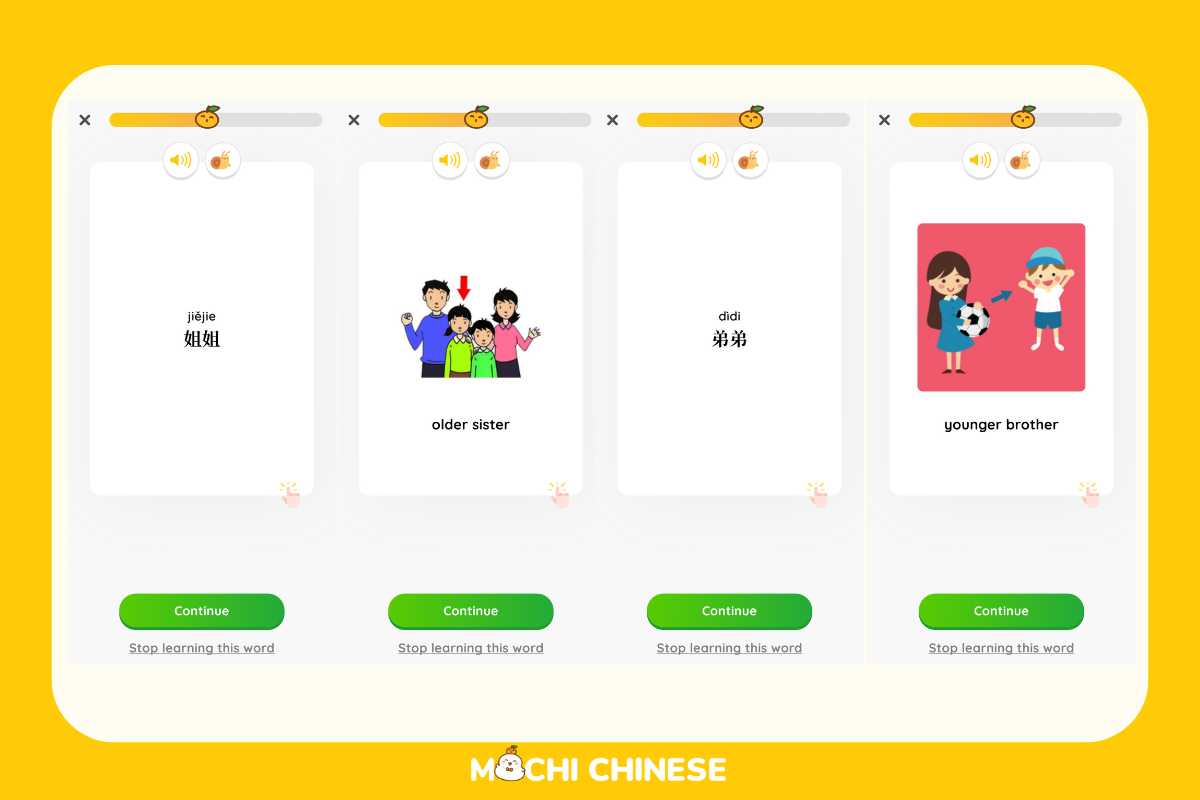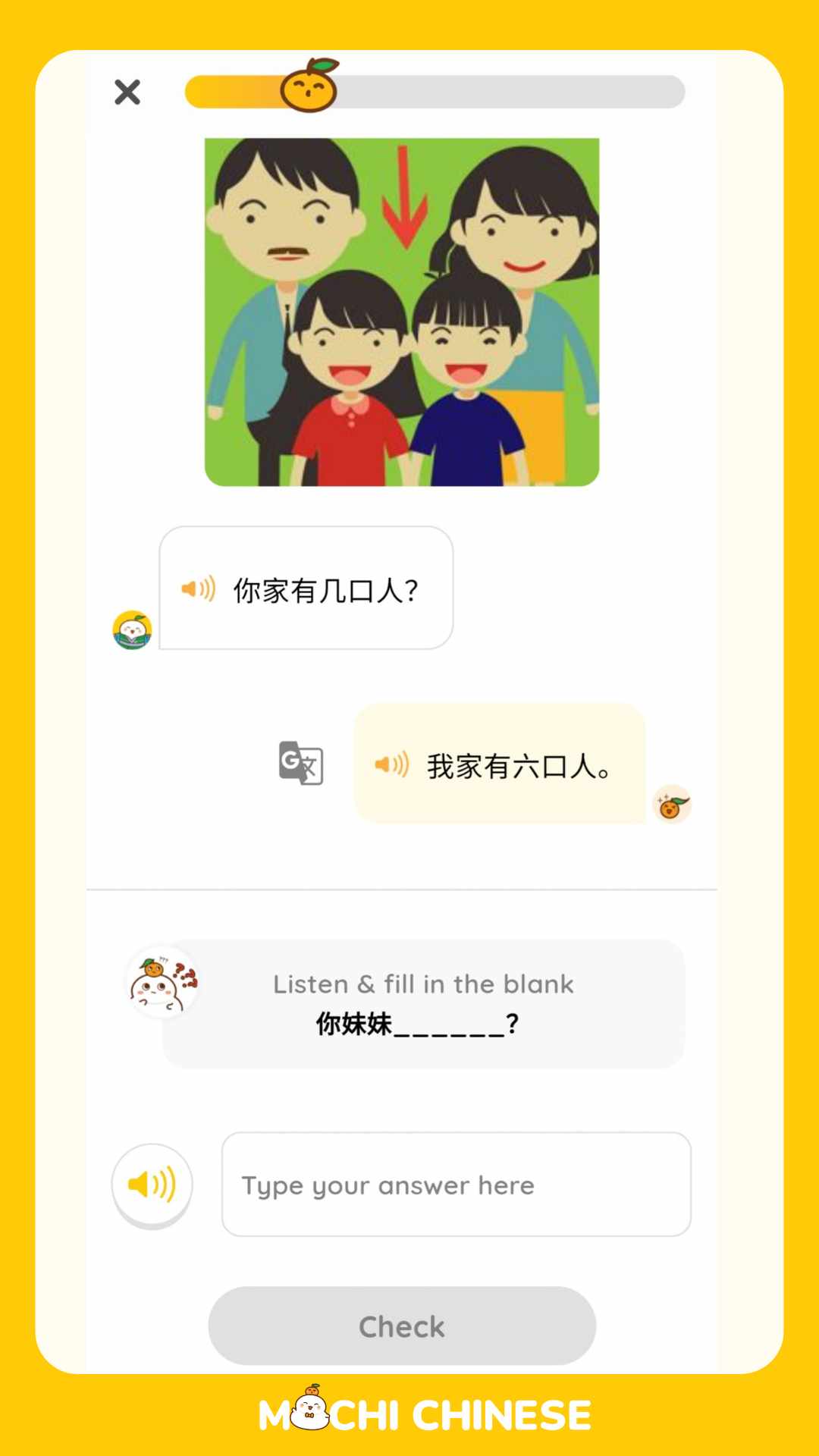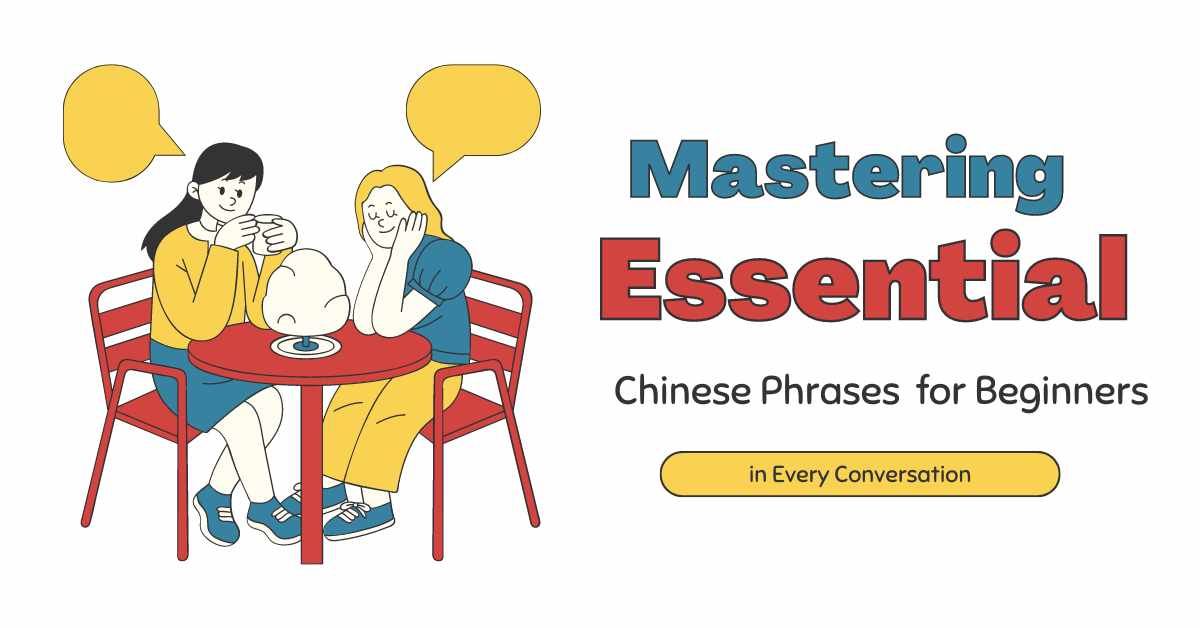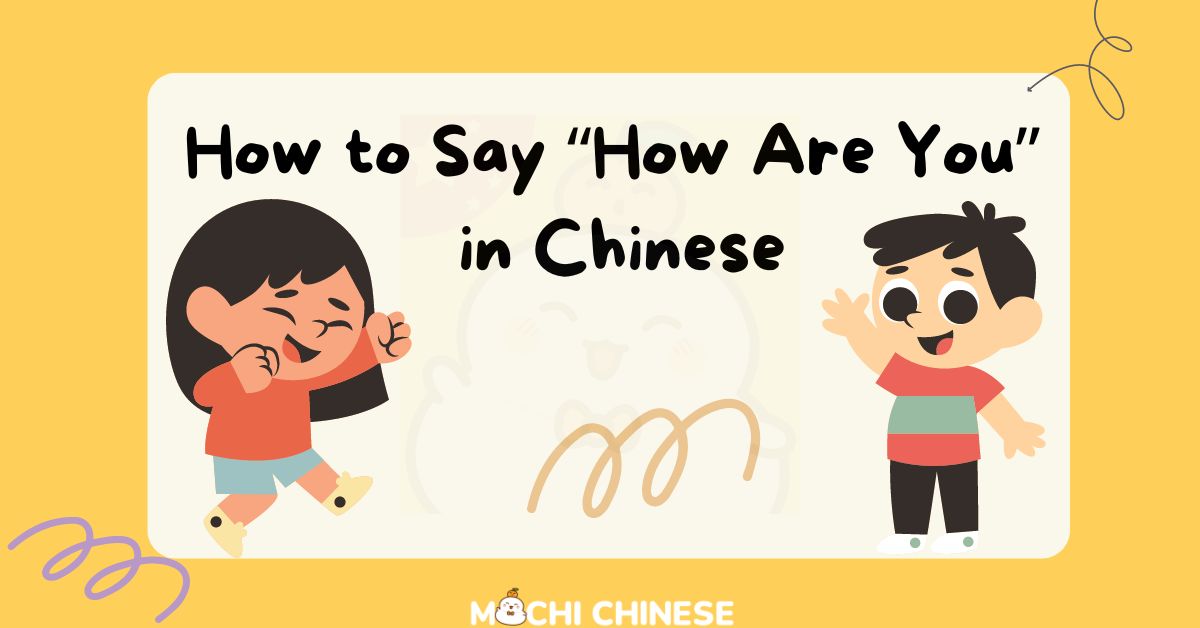Family is the cornerstone of Chinese culture, and understanding the intricacies of familial relationships can deepen your connections with Chinese-speaking friends and relatives. In this guide, we’ll delve into the vocabulary and nuances of addressing family members in Chinese, from parents and siblings to in-laws and extended relatives.
Your family members
Parents and Siblings

In Chinese, the basic family vocabulary encompasses terms for parents and siblings:
Mom: 妈妈 (māma)
Dad: 爸爸 (bàba)
Big Brother: 哥哥 (gēgē)
Little Brother: 弟弟 (dìdi)
Big Sister: 姐姐 (jiějie)
Little Sister: 妹妹 (mèimei)

Understanding these fundamental terms lays the groundwork for navigating Chinese family relationships.
Expanding beyond immediate family, it’s essential to grasp terms for grandparents, aunts, uncles, and cousins. Notably, Chinese distinguishes between maternal and paternal relatives:
Grandparents
Grandfather (paternal): 爷爷 (yéyé)
Grandmother (paternal): 奶奶 (nǎinai)
Grandfather (maternal): 外公 (wàigōng)
Grandmother (maternal): 外婆 (wàipó)
Aunts and Uncles
Uncle (paternal): 叔叔 (shūshu)
Aunt (paternal): 阿姨 (āyí)
Uncle (maternal): 舅舅 (jiùjiu)
Aunt (maternal): 姨妈 (yímā)
Cousins
Male Cousin: 堂兄弟 (táng xiōngdì)
Female Cousin: 堂姐妹 (táng jiěmèi)
Nieces and Nephews
Niece: 侄女 (zhínǚ)
Nephew: 侄子 (zhízǐ)
This differentiation reflects the significance of lineage and heritage in Chinese culture.
Addressing Relatives
Formal and Informal Terms
Chinese familial terms vary in formality, depending on the relationship and regional customs. For instance:
Addressing Parents
Formal:
Father: 父亲 (fùqīn)
Mother: 母亲 (mǔqīn)
Informal:
Father: 爸爸 (bàba)
Mother: 妈妈 (māma)
Addressing Siblings
Formal:
Older Brother: 兄长 (xiōngzhǎng)
Older Sister: 姐姐 (jiějie)
Informal:
Older Brother: 哥哥 (gēge)
Older Sister: 姐姐 (jiějie)
Addressing Grandparents
Formal:
Paternal Grandfather: 祖父 (zǔfù)
Paternal Grandmother: 祖母 (zǔmǔ)
Maternal Grandfather: 外祖父 (wàizǔfù)
Maternal Grandmother: 外祖母 (wàizǔmǔ)
Informal:
Paternal Grandfather: 爷爷 (yéye)
Paternal Grandmother: 奶奶 (nǎinai)
Maternal Grandfather: 外公 (wàigōng)
Maternal Grandmother: 外婆 (wàipó)
Addressing Aunts and Uncles:
Formal:
Paternal Uncle: 伯父 (bófù)
Paternal Aunt: 伯母 (bómǔ)
Maternal Uncle: 叔叔 (shūshu)
Maternal Aunt: 婶婶 (shěnshen)
Informal:
Paternal Uncle: 舅舅 (jiùjiu)
Paternal Aunt: 舅妈 (jiùmā)
Maternal Uncle: 姨丈 (yízhàng)
Maternal Aunt: 姨妈 (yímā)
Addressing Cousins:
Formal:
Older Male Cousin: 表哥 (biǎogē)
Older Female Cousin: 表姐 (biǎojiě)
Younger Male Cousin: 表弟 (biǎodì)
Younger Female Cousin: 表妹 (biǎomèi)
Informal:
Older Male Cousin: 堂哥 (tánggē)
Older Female Cousin: 堂姐 (tángjiě)
Younger Male Cousin: 堂弟 (tángdì)
Younger Female Cousin: 堂妹 (tángmèi)
Understanding when to use formal or informal terms demonstrates cultural awareness and respect for tradition.
Regional Variations
China’s vast geography contributes to regional variations in familial terminology. For example:
In southern China, 外公 (wàigōng) may be the preferred term for both maternal and paternal grandfathers, differing from northern conventions.
Adapting to regional nuances fosters smoother communication and strengthens familial bonds.
Titles for In-Laws
In-law Relations
Navigating in-law relationships involves a unique set of terms:
Father-in-Law: 岳父 (yuèfù) or 公公 (gōnggong)
Mother-in-Law: 岳母 (yuèmǔ) or 婆婆 (pópo)
Brother-in-Law (Husband’s Brother): 夫兄 (fūxiōng)
Brother-in-Law (Wife’s Brother): 妯娌 (zhóulǐ)
Sister-in-Law (Husband’s Sister): 夫姐 (fūjiě)
Sister-in-Law (Wife’s Sister): 妯娌 (zhóulǐ)
Understanding these distinctions is crucial for expressing respect and fostering harmony within the family unit.
Practice Scenarios
Role-Playing Dialogues
To reinforce comprehension, let’s engage in practical scenarios:
A: 你家有几口人?Nǐ jiā yǒu jǐ kǒu rén? (How many people are there in your family?)
B: 我家有四口人。爸爸、妈妈、弟弟和我。Wǒjiā yǒu sì kǒu rén. Bàba, māmā, dìdi hé wǒ. (There are four people in my family: Dad, Mom, my younger brother, and me.)

By actively participating in these dialogues, you’ll become more adept at using family vocabulary in real-life situations.
Conclusion
Mastering family vocabulary in Chinese is akin to unlocking a door to deeper cultural understanding and connection. By familiarizing yourself with these terms and their nuances, you’ll not only navigate familial relationships with ease but also enrich your appreciation for Chinese heritage and tradition. So, go ahead, practice those dialogues, and immerse yourself in the rich tapestry of Chinese family dynamics!
Recommendation: Mochi Chinese App – Memorize 1000 words in 30 days
Mochi Chinese offers a range of features designed to enhance your learning experience, including interactive lessons, quizzes, spaced repetition and Golden Time techniques.
- Focus on Joyful Learning:
Mochi Chinese aims to make learning Chinese fun and engaging. - Bright Design & Adorable Mascots: The app uses cheerful colors and cute characters to keep you motivated.
- Spaced Repetition System: Smart algorithms help you review words at the perfect time to boost memorization.
Download the Mochi Chinese app on Google Play Store, App Store, or Web version!





